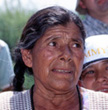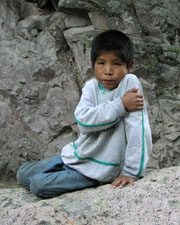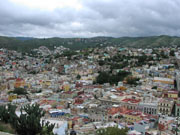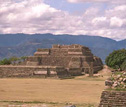Who won the Mexican election .. just like everywhere else in NAFTA (and beyond)?
Jul 6th, 2006 | By Counterweights Editors | Category: Countries of the World The news from Mexico that some have been waiting for since the evening of this past Sunday, July 2 finally arrived in the late afternoon of Thursday, July 6. With all 41 million votes apparently now properly counted, Felipe Calderon of the conservative National Action Party has 35.88%.
The news from Mexico that some have been waiting for since the evening of this past Sunday, July 2 finally arrived in the late afternoon of Thursday, July 6. With all 41 million votes apparently now properly counted, Felipe Calderon of the conservative National Action Party has 35.88%.
Lopez Obrador of the left-wing Democratic Revolution Party has 35.31%. Roberto Madrazo of the discredited old Institutional Revolutionary Party has 22.27%. And: “Two minor candidates split the rest.”
The Ultimate Good News Scenario?
 The immediate concern in some quarters is that Lopez Obrador has “refused to concede and said he’d fight the results in court.” Mexico’s electoral court “has until August 31 to settle any challenge to the results and must announce a new president by September 6.”
The immediate concern in some quarters is that Lopez Obrador has “refused to concede and said he’d fight the results in court.” Mexico’s electoral court “has until August 31 to settle any challenge to the results and must announce a new president by September 6.”
Fortunately, current President Vicente Fox, also of the National Action Party of Felipe Calderon, remains in office until the end of 2006. And if you were wondering why Mexico has its presidential elections so early in the year, when the sitting president still has another half-year to serve, the 2006 results finally seem a pretty good answer.
 This also may suggest that some people in the new and more authentically democratic Mexico that began with Mr. Fox’s election in 2000 really do know what they are doing these days. And, if true, that may mean as well that Mr. Obrador is not going to do anything altogether upsetting and de-stabilizing. (Beyond, that is, standing up for the more than 14 million still hungry people who voted for him, by making quite sure that the election result this time has been fair and right.)
This also may suggest that some people in the new and more authentically democratic Mexico that began with Mr. Fox’s election in 2000 really do know what they are doing these days. And, if true, that may mean as well that Mr. Obrador is not going to do anything altogether upsetting and de-stabilizing. (Beyond, that is, standing up for the more than 14 million still hungry people who voted for him, by making quite sure that the election result this time has been fair and right.)
Then, with (assuming the current results are essentially correct) Felipe Calderon ultimately continuing the Fox legacy, the international financial markets can breathe more easily again. And the new democracy will sail on into some kind of future that continues to look brighter – at least as such things are judged north of the Rio Grande (and north of the 49th Parallel too, to say nothing of the other side of the Atlantic Ocean, or even the Sea of Japan?).
The Continuing Deep Divisions … There and Here Too?
 Of course you can also say that Mr. Calderon’s extremely razor-thin victory, even if it finally does hold up in court, shows just what a vast gulf there still is in Mexico – between, e.g., the (comparatively) rich north, that may have actually started to benefit, a little, from NAFTA, and the still poor south that has not. And it is no doubt ostensibly encouraging that the 43-year-old “Calderon, who would become Mexico’s second-youngest president in almost a century, offered to bridge differences among political parties and serve the entire population of 103 million people after the closest election in Mexican history.”
Of course you can also say that Mr. Calderon’s extremely razor-thin victory, even if it finally does hold up in court, shows just what a vast gulf there still is in Mexico – between, e.g., the (comparatively) rich north, that may have actually started to benefit, a little, from NAFTA, and the still poor south that has not. And it is no doubt ostensibly encouraging that the 43-year-old “Calderon, who would become Mexico’s second-youngest president in almost a century, offered to bridge differences among political parties and serve the entire population of 103 million people after the closest election in Mexican history.”
At the same time again, other North Americans (and Europeans) might equally draw some hope for the future from the almost stark similarities between the 2006 Mexican presidential election and the two most recent national elections in both the United States and Canada (and the most recent Italian and German national elections as well?).
 In the end, some will fret, Felipe Calderon could become President of Mexico with, in round numbers, only 36% of the popular vote. But Stephen Harper is already Prime Minister of Canada with only 36% of the popular vote. It is lamentable, you could say, that the 2006 Mexican election will probably be finally decided in a court. But so was the 2000 presidential election in the USA.
In the end, some will fret, Felipe Calderon could become President of Mexico with, in round numbers, only 36% of the popular vote. But Stephen Harper is already Prime Minister of Canada with only 36% of the popular vote. It is lamentable, you could say, that the 2006 Mexican election will probably be finally decided in a court. But so was the 2000 presidential election in the USA.
And then the Liberal Paul Martin became Prime Minister of Canada in the Canadian federal election of 2004 with only 37% of the popular vote. There have been subterranean rumours of corruption and fraud in the 2004 US presidential election too. (And we won’t go over the details of the most recent Italian and German national elections, in the interests of saving space.)
Welcome to the 21st Century?
 Or, you might reasonably deduce, it is not just in Mexico that the free and democratic society of the early 21st century is deeply divided.
Or, you might reasonably deduce, it is not just in Mexico that the free and democratic society of the early 21st century is deeply divided.
This is a new condition, e.g., that all three NAFTA partners are sharing at the moment. It is, similarly, not exactly easy to say that elected politicians in any of the three countries have as yet seriously adjusted to the new realities of their divided domestic electorates.
 There no doubt remains some rather crucial difference of degree in Mexico. It has, e.g., some three times more people than Canada. Yet the US economy is 15 to 16 times larger than the Mexican economy, but only about 11 times larger than the Canadian economy. And so forth.
There no doubt remains some rather crucial difference of degree in Mexico. It has, e.g., some three times more people than Canada. Yet the US economy is 15 to 16 times larger than the Mexican economy, but only about 11 times larger than the Canadian economy. And so forth.
There is, however, a real enough sense in which the problems of domestic division, cast in such harsh light by the Mexican presidential election result, are problems that Mexico finally shares with its two NAFTA partners (and various other parts of the free and democratic global village today). One way or another, we are all in the same boat now. And that may be a kind of good sign in its own right too?

